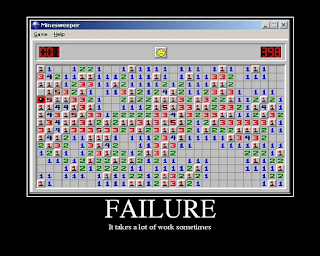I also find myself wondering about how my actual abilities compare to how I perceive them. For example, when I run alone, it feels like everything is standing still and I'm a pure mecurial god floating through time and space. In my mind, I'm not just fast, I am speed itself. But then the inevitable happens. Eventually I run with someone else towards a common goal. It's usually one of us has possession of a ball of some sort and the other one of us is trying to physically oppose holder of said ball. That's when reality hits me. That's when I realize that just about everyone alive is faster than the 6'6", 290 pound guy.
Of course, this realization doesn't mean I'm slow. Quite often, my friends will tell me that I'm actually quick (say it with me) "for a guy my size". Which is like saying that a 1998 Volkswagen Jetta is spacious for a compact. If you have to add a qualifier, it's probably closer to an insult than a compliment. But that's okay. I take it all in stride. Pun intended.
I might be wrong, but I honestly expect almost every endeavor in life to be exactly like that. In theory, it should seem as if there is no obstacle you can't overcome. I'm a planner, and in my head, my plans all lead (eventually) to some form of success. Granted, as a slightly more obsessive than normal planner, I have contingency plans for failures and backup plans but ultimately the statement still holds true: I plan for success, not for failure.
Our plans don't always work out though, do they? Oftentimes, because of our own inabilities and imperfections, we find that our plans, though carefully laid, are dashed by time and unforeseen occurrences. What separates the successful from the unsuccessful however, isn't the quality of the plans, but it is in fact, the willingness to fail.
You've heard it time and time again. Successful people aren't afraid to fail. I'd take that statement a step farther. Successful people are not only unafraid of failure, but they are willing to fail. You could accuse me of merely playing with semantics, and quite frankly, you'd be correct. But the rhetorical choices that we make inwardly tell us a lot about ourselves and our motivations. Think about it. When you say to yourself, "I'm not afraid to fail," what are you really saying?
"I'm not afraid to fail," in my opinion is acknowledging that failure can happen, but that it's not necessary. In many cases, that's just not true. Think of a pharmaceutical researcher and all of the clinical trials and failures he or she must endure to find a working solution to a medicinal problem. There is a level of failure that's expected and acceptable in many cases. In fact, sometimes, we have to be willing to go and fail so that we can be successful later.
That first marketing plan may have taken you forever to conceive and put together, but it could possibly fail in three seconds. The very first business you start, the one you put your heart and soul into could tank horribly, despite how much affection and care you pour into it.
The point being made is that you have to be willing to take that failure, learn from it, and then get back out there willingly and stare that failure in between the eyes as you try again. The old adage, "if at first you don't succeed, try try try again" applies to everything in life you want to experience success in. In some cases, that phrase might better be, "if you never succeed, try try again." I say in some cases, because there are instances where that motto will get you a restraining order and quite possibly some jail time.
If you really feel as if you need to be motivated more, here ya go:

No comments:
Post a Comment